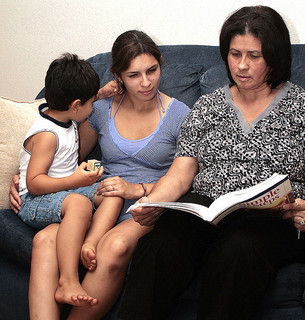November 5, 2012 -- Portland chefs put on a show last month for the Children's Relief Nursery – and brought in at least $60,000 from ticket sales as well as silent and live auction items for the organization, according to Susan Lyon-Myrick, marketing coordinator of LifeWorks NW, adding that final receipts had not been calculated.
 Rick Widmayer of the Screen Door Restaurant held onto his title from last year's event, where he and four other Portland-area chefs competed to make the best autumn-themed appetizers.
Rick Widmayer of the Screen Door Restaurant held onto his title from last year's event, where he and four other Portland-area chefs competed to make the best autumn-themed appetizers.
Last week's Food Network-inspired event was the 12th of its kind, but the first following the nursery's merger with LifeWorks NW this summer.
LifeWorks had provided some mental health services to clients of the nursery for about eight years, but formally merged July 1 due to troubled finances on the nursery's part.
“The biggest piece of the merger was really just the finances of the relief nursery,” said Courtney Towne, director of child and family services at LifeWorks. “I think they were honestly in a place where they were really just wondering if they were going to keep their doors open.” Towne added that many small nonprofits have found themselves in a similar situation since the economic downturn – competing with each other for a dwindling number of dollars.
The Children's Relief Nursery aims to prevent childhood abuse and neglect by working with families who have been screened for signs of stress. The organization operates two locations – one in St. Johns and one at SE 122nd between Division and Stark – that serve families within surrounding communities.
Some families contact the nursery for assistance with parenting or mental health challenges, having learned about it through friends or the 211 referral line, while others have been referred to the agency by home health nurses, Head Start or other social service organizations.
“There's really no wrong door in terms of trying to seek services from the agency,” Towne said, noting that both nursery locations are “catchment” agencies serving only residents of the neighborhoods where they are located, both of which are high-poverty areas. “It really is meant to be a program that’s meeting the highest need and highest risk families in our community.”
Once they make contact with the nursery, families are screened for signs of stress, including recent events such as a job loss, food insecurity, and longer-term issues like the education level, mental health history and family background of the parents. Families can come in two days a week for coaching in social, emotional and developmental skills, or psychotherapy. Staff members also work with children on developing social and emotional intelligence, including appropriate interactions with their peers, and staff members make regular home visits as well to help families manage day-to-day challenges.
In addition, Towne said, the nursery provides services to clients like drop-in childcare for parents who may need to go to a job interview or a medical appointment. Also, LifeWorks is rapidly expanding the services it provides to the nursery's clients. That includes individual mental health and addiction treatment, for both adults and youth, which Towne said was a “no brainer” given that LifeWorks has provided mental health and addiction counseling for more than 50 years.
LifeWorks will also – under a contract with the federal Substance Abuse and Mental Health Services Administration – start investigating integrating primary care into nursery settings. While LifeWorks has provided some primary care to mental health clients for the past several years, the contract will focus specifically on early childhood interventions, Towne said. The federal funding will also allow the organization to provide community education on how to screen for signs of abuse in pre-verbal infants, which many child care providers have not been trained to recognize.
Another project on the horizon includes working with military families to help children cope with the trauma of having a parent who is deployed.
Image for this story by the U.S. Army Family MWR (CC BY 2.0) via Flickr.